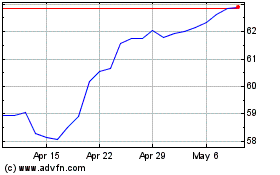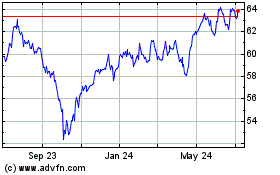By Mike Esterl
To watch the heat rising on the soda industry, take a look at
San Antonio.
Coca-Cola Co., PepsiCo Inc. and Dr Pepper Snapple Group Inc.
have been pouring millions of dollars into fitness and health
programs in the Texas city, where about two thirds of adults are
overweight or obese and the diabetes rate is roughly twice the
national average. Their message: Good health is about exercise, not
just fewer calories.
Those efforts, begun in 2012, paid a big dividend last year when
San Antonio's city council balked at a public-education campaign
proposed by the city's health director that aimed to reduce soda
consumption. Several council members argued soda was being singled
out unfairly; some said the effort smacked of a "nanny state."
Then, after it looked like the issue was going away, Bexar
County--which includes and surrounds San Antonio--started to issue
its own warnings about soda. The countywide campaign--called "Is
Your Drink Sugar-Packed?"--has launched a website and distributed
more than 5,000 posters and fliers since June. Three digital
billboards began running the slogan last week and organizers plan
to advertise on television. "You wouldn't eat 16 teaspoons of
sugar. So why drink them?" says a campaign pamphlet, referring to
the amount of sugar in a 20-ounce soda bottle.
The reversal highlights one of the soft drink industry's biggest
challenges: constantly fighting the perception that soda is really
bad for you. No matter how much money it spends on research or
argues that exercise lowers obesity, the industry is playing a
never-ending game of Whac-A-Mole. When it beats down critics in one
place, they pop right back up in another.
Chicago has received millions of industry dollars for health and
fitness programs in recent years, but that didn't stop the chairman
of the city council's health committee from proposing a
penny-per-ounce tax on sugary drinks in July. In Minneapolis,
another past recipient of grants, the city's health department
launched a "Rethink Your Drink" campaign this summer. San Francisco
officials voted in June to require health warnings on sugary drink
advertisements, months after the industry spent heavily to defeat a
special tax.
William Dermody, vice president of policy at the American
Beverage Association, said the industry opposes campaigns "not
supported by science" and that "no single food or beverage uniquely
causes obesity." Coke spokesman Dan Schafer said the industry
"consistently opposes efforts that target one product or one
category or that attack our products in sensational ways."
Yet when beverage companies try to defend soda "there's inherent
skepticism because they're not an impartial actor," said Stephen
Powers, a beverage-industry analyst at UBS.
Meanwhile, negative soda studies and pronouncements are piling
up. In July the Food and Drug Administration proposed that
nutrition labels list added sugar amounts and a recommended maximum
daily sugar intake of 200 calories--40 fewer calories than a
20-ounce Coke. The American Heart Association, a partner in the
Bexar County campaign, recommends that adults limit sugar-sweetened
beverages to 36 ounces a week.
"There is a robust body of evidence linking high intakes of
sugary drinks to obesity," said Rachel Johnson, a heart association
spokeswoman and professor of nutrition at the University of
Vermont. Exercise is important, but a person needs to walk about 1
mile to burn off 100 calories, she added.
San Antonio became a jump ball in this debate in 2010. That year
the city removed sugary drinks from city employee vending machines
as part of a broader health-and-wellness push. That year, the city
also was awarded a $15.6 million federal grant to tackle
obesity.
Two years later, the American Beverage Association, an industry
umbrella group, announced a $5 million grant for a "wellness
competition" between city employees in San Antonio and Chicago. The
partnership "puts the spotlight on ways to do things
collaboratively," Susan Neely, the beverage association president,
said at the time.
Then in 2013, Coke announced $1.5 million in new grants "to get
San Antonians moving" by bankrolling programs that included
distributing bicycles to community centers and military-style
exercise classes called Coca-Cola Troops for Fitness.
A government survey showed progress. It estimated San Antonio's
adult obesity rate dropped to 29% from 35% between 2010 and 2012.
It also found the percentage of residents who drank soda daily fell
to 64% from 71%, suggesting the trends were linked.
Last year, Thomas Schlenker, then director of the San Antonio
Metropolitan Health District, proposed the anti-soda campaign to
drive still-high obesity even lower with a poster of a Rosie the
Riveter look-alike that read: "Soda? No, thank you!"
Several council members opposed the effort, arguing the city
should focus on fitness initiatives instead of telling people what
to eat. "Once you start going down that road, there's an unlimited
number of things you could regulate" including steak, said
councilman Joe Krier in an interview.
Mr. Schlenker said the beverage industry also was given veto
rights over campaign specifics in working committee meetings
attended by a Coke official. Coke said its employee attended as an
industry representative but didn't have veto rights. By January,
the campaign was dead, and in July, Mr. Schlenker was fired.
He believes he was fired because of his tough stance on soft
drinks. In a statement, City Manager Sheryl Sculley said the reason
was "increasing dissatisfaction with his lack of leadership,
continued disregard for direction and repeated instances of
unprofessional conduct." City officials said the beverage industry
didn't exert undue influence on the campaign.
County officials stepped in after hearing the campaign had died
in San Antonio. "It's not a Big Brother thing telling [residents]
you might drink more sugar than you think," said Bexar County Judge
Nelson Wolff, head of the county's governing body.
Their campaign is backed by a coalition of about 20
organizations including the county's public hospital, the San
Antonio Independent School District, South Texas Academy of
Nutrition & Dietetics and American Diabetes Association.
The website www.sugar-packed.com warns of the dangers of sugary
drinks and helps visitors calculate how much sugar they're
consuming when they grab a soda, energy drink, sweet tea or orange
fruit beverage. A video on the website shows a man sitting at a
diner emptying one packet of sugar after another into his mouth
while the woman next to him drinks a cola. "Why would you drink
that much in added sugars?" it asks.
Subscribe to WSJ: http://online.wsj.com?mod=djnwires
(END) Dow Jones Newswires
September 03, 2015 05:44 ET (09:44 GMT)
Copyright (c) 2015 Dow Jones & Company, Inc.
Coca Cola (NYSE:KO)
Historical Stock Chart
From Mar 2024 to Apr 2024

Coca Cola (NYSE:KO)
Historical Stock Chart
From Apr 2023 to Apr 2024
